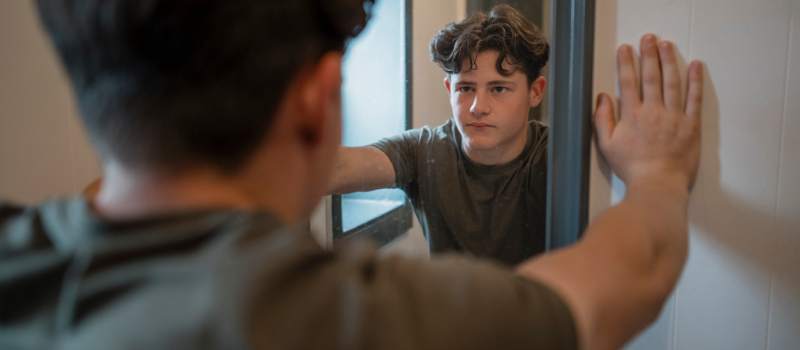
Table of Contents
How IOP Can Help With Rejection Sensitive Dysphoria
Written By: Charlie Health Editorial Team

Clinically Reviewed By: Dr. Don Gasparini
June 7, 2023
7 min.
Some people, particularly those with attention-deficit/hyperactivity disorder (ADHD) or anxiety, may have strong reactions to the perception or fear of rejection, also known as rejection sensitive dysphoria (RSD) –– but help at Charlie Health is available for these individuals to feel better.
Learn more about our Clinical Review Process
Table of Contents
Picture a scenario where the tiniest hint of rejection or criticism sets off an avalanche of overwhelming emotions, leaving you feeling vulnerable, inadequate, and misunderstood. This situation is a reality for many people with rejection sensitive dysphoria (RSD). While not considered an official clinical diagnosis, RSD is a label used to describe people with an intense emotional response to the perception or fear of rejection or criticism. It also often intersects with attention deficit hyperactivity disorder (ADHD) and anxiety.
Here’s what you need to know about the possible causes, impacts, and treatments for RSD, including how intensive outpatient programming (IOP) at Charlie Health can help.

Personalized neurodivergent-affirming care
Find out if IOP is the right fit for yourself or a loved one.
What is RSD?
Dr. William Dodson first coined RSD to describe a psychological phenomenon that some people with ADHD experience. The term describes a strong emotional reaction triggered by the perception or fear of facing rejection, criticism, or disappointment from others. RSD can significantly impact a person’s relationships, self-esteem, and overall well-being. While RSD is commonly associated with ADHD and anxiety, it can also occur in people without ADHD.
People with RSD tend to have heightened sensitivity to social cues and a strong desire for acceptance and validation. They often interpret neutral or ambiguous social situations as signs of rejection or disapproval, even when no actual rejection is intended. This hypersensitivity can trigger overwhelming emotional reactions, such as feelings of shame, humiliation, anger, or sadness.
The symptoms of RSD can vary from person to person but may include:
- Extreme sensitivity to criticism or perceived criticism
- Fear of failure or making mistakes
- Avoidance of social or performance situations due to fear of rejection
- Low self-esteem and self-worth
- Emotional volatility and mood swings
- Perfectionism and excessive self-criticism
Mental health professionals do not universally recognize RSD, and its existence and significance are still debated within the fields of psychiatry and psychology. Some experts believe that RSD may be better understood as a manifestation of other underlying conditions, such as anxiety or emotional dysregulation, rather than a distinct disorder on its own.
How is rejection sensitivity treated?
Since RSD is not a formal clinical diagnosis, no treatment protocol is developed specifically for the condition. However, it’s recommended that people with RSD seek professional mental health support since the emotional difficulties associated with the condition can be addressed through therapy, medication, or a combination of both. Here are some potential treatment options that may be helpful:
Psychoeducation
Psychoeducation, the process of learning about mental health conditions, helps people with RSD better understand the condition’s potential causes and how it relates to their experiences. Psychoeducation can also provide strategies for coping with rejection sensitivity, the heightened emotional reaction to the perception or fear of rejection or criticism from others. Understanding RSD and its impact can be an essential first step in the healing journey.
Cognitive behavioral therapy (CBT)
CBT can help people identify and challenge negative thought patterns and cognitive distortions related to rejection and criticism. It focuses on developing healthier ways of thinking and responding to social situations.
Dialectical behavior therapy (DBT)
DBT combines elements of CBT with mindfulness practices. It can be beneficial for individuals with RSD as it addresses emotional regulation, distress tolerance, and interpersonal effectiveness.
Social skills training
This type of training focuses on developing effective communication, assertiveness, and conflict-resolution skills, which can help people improve their interactions with others and reduce sensitivity to perceived rejection.
Medication
There is no specific medication approved for RSD, but some people with ADHD and RSD may benefit from medication prescribed for ADHD symptoms. Stimulant medications or other ADHD medications might help manage attention and emotional regulation difficulties, which can indirectly alleviate RSD symptoms.
The benefits of IOP for RSD
IOP—a personalized treatment option often consisting of group and individual therapy multiple times per week—offers several advantages that may help people with RSD. IOP allows for personalized treatment plans tailored to the specific needs of each individual with RSD. In individual therapy, therapists can work closely with clients to identify their unique triggers, develop coping mechanisms, and set achievable goals for managing RSD symptoms.
Additionally, IOP allows people to engage in group therapy, fostering a supportive environment where they can connect with others with RSD, exchange coping strategies specific to the condition, and receive validation for their experiences. Sharing struggles and successes within the group can help normalize people’s feelings about RSD and provide a fresh perspective on managing rejection sensitivity.
Group therapy also offers opportunities for social skills practice, allowing participants to receive feedback, learn from one another’s experiences, and develop effective communication and assertiveness techniques—essential skills for people learning to cope with rejection sensitivity. Witnessing the growth and progress of fellow group members can be inspiring and motivating, instilling hope that change and improvement are possible. Overall, group therapy provides a platform for people with RSD to gain support, learn coping strategies, and develop a sense of empowerment in navigating the challenges associated with rejection sensitivity.

Rejection sensitivity and ADHD
RSD is not a standalone clinical diagnosis, but it is often seen in people with ADHD. According to Dr. Dodson, who coined the term, rejection sensitivity is one of three major mood problems found in people with ADHD. Of the three mood problems—over-reaction, shame and guilt, and rejection sensitivity—Dr. Dodson says RSD “seems to be associated exclusively with ADHD.”
People with ADHD may be more prone to experiencing rejection sensitivity—an intense emotional response to perceived or feared rejection—due to their difficulties with attention regulation, impulse control, and social interactions (core symptoms of ADHD). The challenges in maintaining focus, controlling impulsive reactions, and managing social dynamics can contribute to people with ADHD misinterpreting social situations as rejecting or critical.
Also, people with ADHD may have experienced negative feedback, rejection, or difficulties in social relationships due to their ADHD symptoms. These experiences can further heighten their sensitivity to rejection and contribute to the development of RSD.
Despite Dr. Dodson’s findings, not all people with ADHD have RSD, and not all people with RSD have ADHD. Some experts, for instance, believe that RSD may be more directly linked with conditions including anxiety, emotional dysregulation, or borderline personality disorder (BPD).
Rejection sensitivity versus social anxiety
RSD and social anxiety are distinct but related phenomena that can impact a person’s social interactions and emotional well-being.
As discussed, people with RSD may be overly sensitive to social cues and tend to interpret neutral or ambiguous situations as signs of rejection. They may experience intense emotional distress, fear, and anxiety when faced with the possibility of rejection, also known as rejection sensitivity.
On the other hand, social anxiety, also known as social phobia, involves an intense and persistent fear of social situations in which people may feel embarrassed, judged, or humiliated. People with social anxiety often have a strong desire to avoid social interactions or may endure them with significant distress. A major aspect of social anxiety is the fear of being judged negatively and rejected by others.
RSD and social anxiety both involve concerns related to social interactions and the fear of rejection, but there are some key differences. RSD tends to focus specifically on the fear of rejection and the emotional response to it, whereas social anxiety encompasses a broader range of fears related to social situations and judgments by others. Social anxiety can extend beyond rejection sensitivity, including general performance anxiety, fear of public speaking, and discomfort in various social settings.
People can have both RSD and social anxiety, and the two can even exacerbate one another. Some people with social anxiety may develop heightened rejection sensitivity due to their fear of negative evaluation. In contrast, those with RSD may develop social anxiety due to the distress caused by their sensitivity to rejection.
Understanding the differences between rejection sensitivity and social anxiety enables mental health professionals to offer interventions and treatments that specifically target people’s challenges in social situations.
How RSD and ADHD are treated at Charlie Health
If you’re currently dealing with rejection sensitivity or struggling to cope with ADHD, you may want to consider seeking help. Charlie Health’s compassionate mental health professionals are here to listen to your story, understand your needs, and match you with an appropriate plan to get support and treatment for ADHD and RSD.
Our personalized virtual Intensive Outpatient Program (IOP) offers mental health treatment for teens, young adults, and families dealing with various mental health struggles, including rejection sensitivity, anxiety, and ADHD. If this sounds like you or a loved one, Charlie Health is here to offer support and treatment for ADHD and RSD. Get started today.




